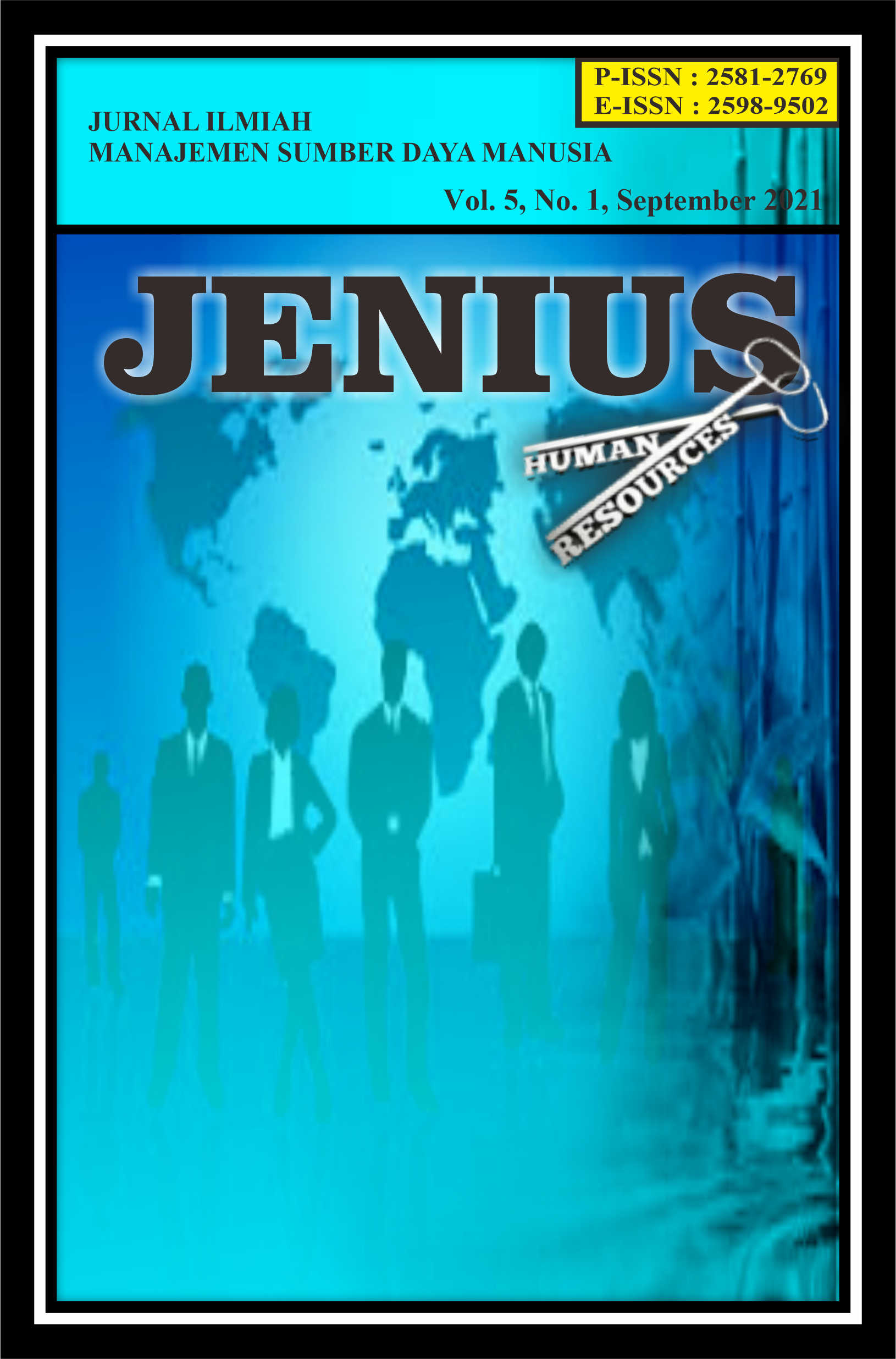Pengaruh Persepsi Dukungan Organisasi, Komitmen Organisasi, dan Spiritualitas Kerja Terhadap Produktivitas Kerja Dengan Organizational Citizenship Behavior (OCB) Sebagai Variabel Intervening Pada Direktorat Sumber Daya Manusia Universitas Airlangga
DOI:
https://doi.org/10.32493/JJSDM.v5i1.13154Keywords:
Produktivitas Kerja, OCB, Persepsi Dukungan Organisasi, Komitmen Organisasi, Spiritualitas KerjaAbstract
Produktivitas kerja menjadi topik utama pembahasan dalam era persaingan tata kelola di perguruan tinggi termasuk di Universitas Airlangga. Penelitian ini bertujuan untuk mencari hubungan antara persepsi dukungan organisasi, komitmen organisasi, dan spiritualitas kerja terhadap produktivitas kerja baik secara langsung maupun tidak langsung melalui variabel organizational citizenship behavior. Setelah dilakukan uji menggunakan metode structural equation modelling (SEM) kepada pegawai dan tenaga magang di Direktorat Sumber Daya Manusia Universitas Airlangga sebanyak 50 responden diperoleh hasil hanya variabel spiritualitas kerja yang berpengaruh signifikan dan positif terhadap variabel organizational citizenship behavior (OCB) dan variabel Organizational citizenship behavior tidak berpengaruh signifikan sebagai variabel intervening antara variabel persepsi dukungan organisasi, komitmen organisasi, dan spiritualitas kerja terhadap produktivitas kerja. Penelitian selanjutnya diharapkan lebih dapat memperbanyak sampel data dan pemilihan variabel disesuaikan dengan karakteristik responden.
References
Andika, R. (2019). Pengaruh Motivasi Kerja dan Persaingan Kerja Terhadap Produktivitas Kerja Melalui Kepuasan Kerja sebagai Variabel Intervening Pada Pegawai Universitas Pembangunan Panca Budi Medan. Jumant, 11(1), 189-206.
Anshori, M., & Iswati, S. (2019). Metodologi penelitian kuantitatif: edisi 1. Airlangga University Press.
Ashmos, D. P., & Duchon, D. (2000). Spirituality at work: A conceptualization and measure. Journal of management inquiry, 9(2), 134-145.
Aspiyah, M., & Martono, S. (2016). Pengaruh Disiplin Kerja, Lingkungan Kerja dan Pelatihan pada Produktivitas Kerja. Management Analysis Journal, 5(4).
Eisenberger, R., Armeli, S., Rexwinkel, B., Lynch, P. D., & Rhoades, L. (2001). Reciprocation of perceived organizational support. Journal of applied psychology, 86(1), 42.
Ghozali, I., & Fuad. (2008). Structural equation modeling: Teori, konsep, dan aplikasi dengan program Lisrel 8.80. Badan Penerbit Universitas Diponegoro.
Insani, P. B. E. B. (2020). Hubungan Gaya Kepemimpinan Dengan Produktivitas Kerja Pegawai Bmt El Bina Insani Cugenang. Jurnal Agrita Vol, 2(1).
Kartikasari, D., & Cherny, K. B. (2017). Pengaruh stres dan motivasi terhadap produktivitas kerja karyawan pada PT Epson Batam. Jurnal Akuntansi, Ekonomi dan Manajemen Bisnis, 5(1), 80-90.
Lestari, E. R., & Ghaby, N. K. (2018). The influence of Organizational Citizenship Behavior (OCB) on employee's job satisfaction and performance. Industria: Jurnal Teknologi dan Manajemen Agroindustri, 7(2), 116-123.
Meyer, J. P., Allen, N. J., & Smith, C. A. (1993). Commitment to organizations and occupations: Extension and test of a three-component conceptualization. Journal of applied psychology, 78(4), 538.
Milliman, J., Czaplewski, A. J., & Ferguson, J. (2003). Workplace spirituality and employee work attitudes: An exploratory empirical assessment. Journal of organizational change management.
Mowday, R. T., Porter, L. W., & Steers, R. M. (2013). Employee—organization linkages: The psychology of commitment, absenteeism, and turnover. Academic press.
Organ, D. W. (1988). Organizational citizenship behavior: The good soldier syndrome. Lexington Books/DC Heath and Com.
Podsakoff, P. M., MacKenzie, S. B., Paine, J. B., & Bachrach, D. G. (2000). Organizational citizenship behaviors: A critical review of the theoretical and empirical literature and suggestions for future research. Journal of management, 26(3), 513-563.
Prasada, D., et al (2020). Pengaruh Etos Kerja Dan Kompensasi Terhadap Komitmen Organisasi Pada DHL Logistic Di Jakarta. JENIUS (Jurnal Ilmiah Manajemen Sumber Daya Manusia), 4(1), 51-60.
Pratiwi, E. D. (2016). Faktor yang mempengaruhi niat menggunakan Instagram dengan the theory of reasoned action menggunakan Amos 21. Jurnal Teknik Komputer, 2(1), 68-77.
Putra, M. E. N., Moeins, A., & Kasmir, K. (2019). Pengaruh Persepsi Dukungan Organisasi Dan Sikap Kerja Terhadap Produktivitas Kerja Karyawan Pada PT. Prima Utama. MAGMA: Jurnal Magister Manajemen, 4(1).
Putra, P. D. P., & Sriathi, A. A. (2017). Pengaruh Perceived Organizational Support Dan Komitmen Organisasi Terhadap Organizational Citizenship Behavior (Doctoral dissertation, Udayana University).
Ridlo, M., Wardahana, I. A., & Jessica, K. G. (2021). The effect of job satisfaction, workplace spirituality and organizational commitment on work productivity with organizational citizenship behavior (OCB) as intervening variable (Case study on Bank Muamalat Indonesia KC Solo). Journal of Business and Banking, 10(2), 249-264.
Robbins, S. P. (2003). Perilaku Organisasi, Jilid 2. Jakarta: PT. Indeks Kelompok Gramedia.
Santoso, Singgih. (2021). Analisis Structural Equation Modelling (SEM) Menggunakan AMOS 26. Jakarta: Elex Media Komputindo Kelompok Gramedia.
Sugiyono. (2011). Metode Penelitian Kuantitatif, Kualitatif, Dan R&D:cetakan 14. Penerbit Alfa Beta
Sunarsi, D. (2018). Pengaruh rekrutmen, seleksi dan pelatihan terhadap produktivitas kerja karyawan. KREATIF: Jurnal Ilmiah Prodi Manajemen Universitas Pamulang, 6(1), 14-31.
Downloads
Published
How to Cite
Issue
Section
License
Copyright (c) 2021 Rizki Kurnia Aqdami

This work is licensed under a Creative Commons Attribution 4.0 International License.
Authors who publish in this journal agree to the following terms:
The author owns the copyright of the article and assigns to the journal the right of first publication with the work simultaneously licensed under the terms Atribusi 4.0 Internasional (CC BY 4.0)
 which allows others to share the work with acknowledgment of the work's authorship and initial publication in this journal.
which allows others to share the work with acknowledgment of the work's authorship and initial publication in this journal.Authors may enter into separate additional contractual arrangements for the non-exclusive distribution of the published journal version of the work (for example, posting it to an institutional repository or publishing it in a book), with acknowledgment of the work's original publication in this journal.
Authors are permitted and encouraged to post their work online (for example, in institutional repositories or on their websites) before and during the submission process, as this can lead to productive exchanges, as well as earlier and larger citations of published work (See The Effect of Open Access).






.png)

